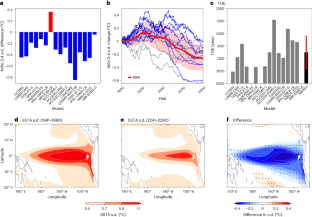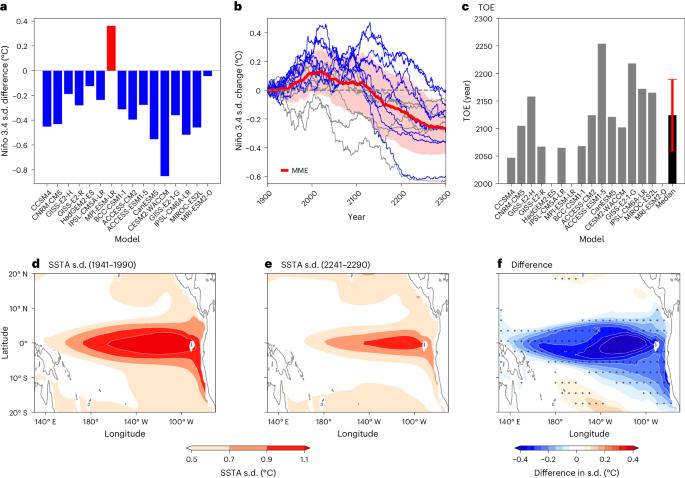Collapsed upwelling projected to weaken ENSO under sustained warming beyond the twenty-first century
IF 29.6
1区 地球科学
Q1 ENVIRONMENTAL SCIENCES
引用次数: 0
Abstract
The El Niño–Southern Oscillation (ENSO) in a warming climate has been studied extensively, but the response beyond 2100 has received little attention. Here, using long-term model simulations, we find that while ENSO variability exhibits diverse changes in the short term, there is a robust reduction in ENSO variability by 2300. Continued warming beyond 2100 pushes sea surface temperature above the convective threshold over the eastern Pacific, causing collapsed mean equatorial upwelling with intensified deep convection. We show that the weakened thermocline feedback due to the collapsed upwelling and increased thermal expansion coefficient, along with enhanced thermodynamic damping, are crucial to reducing ENSO amplitude under sustained warming. Our results suggest a threshold behaviour in the tropical Pacific, where a convective atmosphere over the eastern equatorial Pacific causes dramatic shifts in ENSO variability. This threshold is not crossed under low-emission scenarios. How the El Niño–Southern Oscillation (ENSO) will change under sustained warming beyond the year 2100 is not well known. Here the authors show that while ENSO variability will exhibit diverse changes in the short term, continued warming will lead to a consistent decrease in variability in the long term.


预计在二十一世纪以后持续变暖的情况下,上升流的崩溃将削弱厄尔尼诺/南方涛动
人们对气候变暖条件下的厄尔尼诺-南方涛动(ENSO)进行了广泛研究,但对 2100 年以后的反应却关注甚少。在这里,我们利用长期模型模拟发现,虽然厄尔尼诺/南方涛动的变异性在短期内表现出多种变化,但到 2300 年,厄尔尼诺/南方涛动的变异性会显著降低。2100 年以后的持续变暖将海面温度推高到东太平洋对流阈值之上,导致平均赤道上升流崩溃,深层对流加剧。我们的研究表明,在持续变暖的情况下,上涌坍塌和热膨胀系数增加导致的热跃层反馈减弱,以及热力学阻尼的增强,对于降低厄尔尼诺/南方涛动的振幅至关重要。我们的研究结果表明,热带太平洋存在一个阈值行为,即赤道东部太平洋上空的对流大气会导致厄尔尼诺/南方涛动变率的急剧变化。在低排放情景下,这一阈值不会被跨越。
本文章由计算机程序翻译,如有差异,请以英文原文为准。
求助全文
约1分钟内获得全文
求助全文
来源期刊

Nature Climate Change
ENVIRONMENTAL SCIENCES-METEOROLOGY & ATMOSPHERIC SCIENCES
CiteScore
40.30
自引率
1.60%
发文量
267
审稿时长
4-8 weeks
期刊介绍:
Nature Climate Change is dedicated to addressing the scientific challenge of understanding Earth's changing climate and its societal implications. As a monthly journal, it publishes significant and cutting-edge research on the nature, causes, and impacts of global climate change, as well as its implications for the economy, policy, and the world at large.
The journal publishes original research spanning the natural and social sciences, synthesizing interdisciplinary research to provide a comprehensive understanding of climate change. It upholds the high standards set by all Nature-branded journals, ensuring top-tier original research through a fair and rigorous review process, broad readership access, high standards of copy editing and production, rapid publication, and independence from academic societies and other vested interests.
Nature Climate Change serves as a platform for discussion among experts, publishing opinion, analysis, and review articles. It also features Research Highlights to highlight important developments in the field and original reporting from renowned science journalists in the form of feature articles.
Topics covered in the journal include adaptation, atmospheric science, ecology, economics, energy, impacts and vulnerability, mitigation, oceanography, policy, sociology, and sustainability, among others.
 求助内容:
求助内容: 应助结果提醒方式:
应助结果提醒方式:


